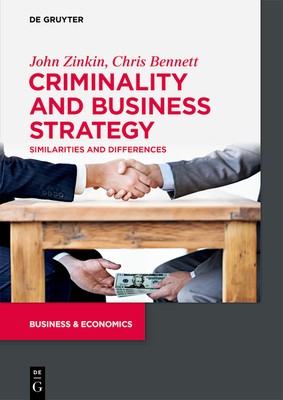
- We will send in 10–14 business days.
- Author: John Zinkin
- Publisher: De Gruyter
- Year: 2022
- Pages: 300
- ISBN-10: 3110711893
- ISBN-13: 9783110711899
- Format: 17 x 24.4 x 1.2 cm, minkšti viršeliai
- Language: English
- SAVE -10% with code: EXTRA
Reviews
Description
Criminality and Business Strategy: Similarities and Differences explores what can be learned from criminal organizations on four continents based on comparisons of their historical and cultural origins, chosen governance and power structures, and business models. It discusses how these contexts determined their applications of the principles and practice of effective, but amoral leadership, and whether these lessons can be applied to legitimate business enterprises.
In this book John Zinkin and Chris Bennett argue that defining a "crime" is a contested issue and that criminality can be viewed as a spectrum, comprising a range of different types of crimes, the harms caused, and the variety of punishments involved. They discuss the critical role of the state in determining where criminality is perceived to sit on the crime continuum.
The authors delve into how the state and organized crime are natural competitors, and how organized crime and legitimate businesses are subject to many of the same internal and external strategic considerations. They contend that the resulting similarities between criminality in organized criminal organizations and legitimate businesses are greater than the differences and that the differences are only in degree and not in kind.
This thought-provoking study of criminality will be of immense interest to professionals, coaches, consultants, and academics interested in the techniques and ethics of leadership. The book is, in effect, the result of an intellectual journey of the authors from the ideas presented in their earlier book, The Principles and Practice of Effective Leadership, to the issues in this book discussing important, difficult, and contested subjects. The journey continues in their third book: The Challenge in Leading Ethical and Successful Organizations.
EXTRA 10 % discount with code: EXTRA
The promotion ends in 23d.07:01:35
The discount code is valid when purchasing from 10 €. Discounts do not stack.
- Author: John Zinkin
- Publisher: De Gruyter
- Year: 2022
- Pages: 300
- ISBN-10: 3110711893
- ISBN-13: 9783110711899
- Format: 17 x 24.4 x 1.2 cm, minkšti viršeliai
- Language: English English
Criminality and Business Strategy: Similarities and Differences explores what can be learned from criminal organizations on four continents based on comparisons of their historical and cultural origins, chosen governance and power structures, and business models. It discusses how these contexts determined their applications of the principles and practice of effective, but amoral leadership, and whether these lessons can be applied to legitimate business enterprises.
In this book John Zinkin and Chris Bennett argue that defining a "crime" is a contested issue and that criminality can be viewed as a spectrum, comprising a range of different types of crimes, the harms caused, and the variety of punishments involved. They discuss the critical role of the state in determining where criminality is perceived to sit on the crime continuum.
The authors delve into how the state and organized crime are natural competitors, and how organized crime and legitimate businesses are subject to many of the same internal and external strategic considerations. They contend that the resulting similarities between criminality in organized criminal organizations and legitimate businesses are greater than the differences and that the differences are only in degree and not in kind.
This thought-provoking study of criminality will be of immense interest to professionals, coaches, consultants, and academics interested in the techniques and ethics of leadership. The book is, in effect, the result of an intellectual journey of the authors from the ideas presented in their earlier book, The Principles and Practice of Effective Leadership, to the issues in this book discussing important, difficult, and contested subjects. The journey continues in their third book: The Challenge in Leading Ethical and Successful Organizations.


Reviews